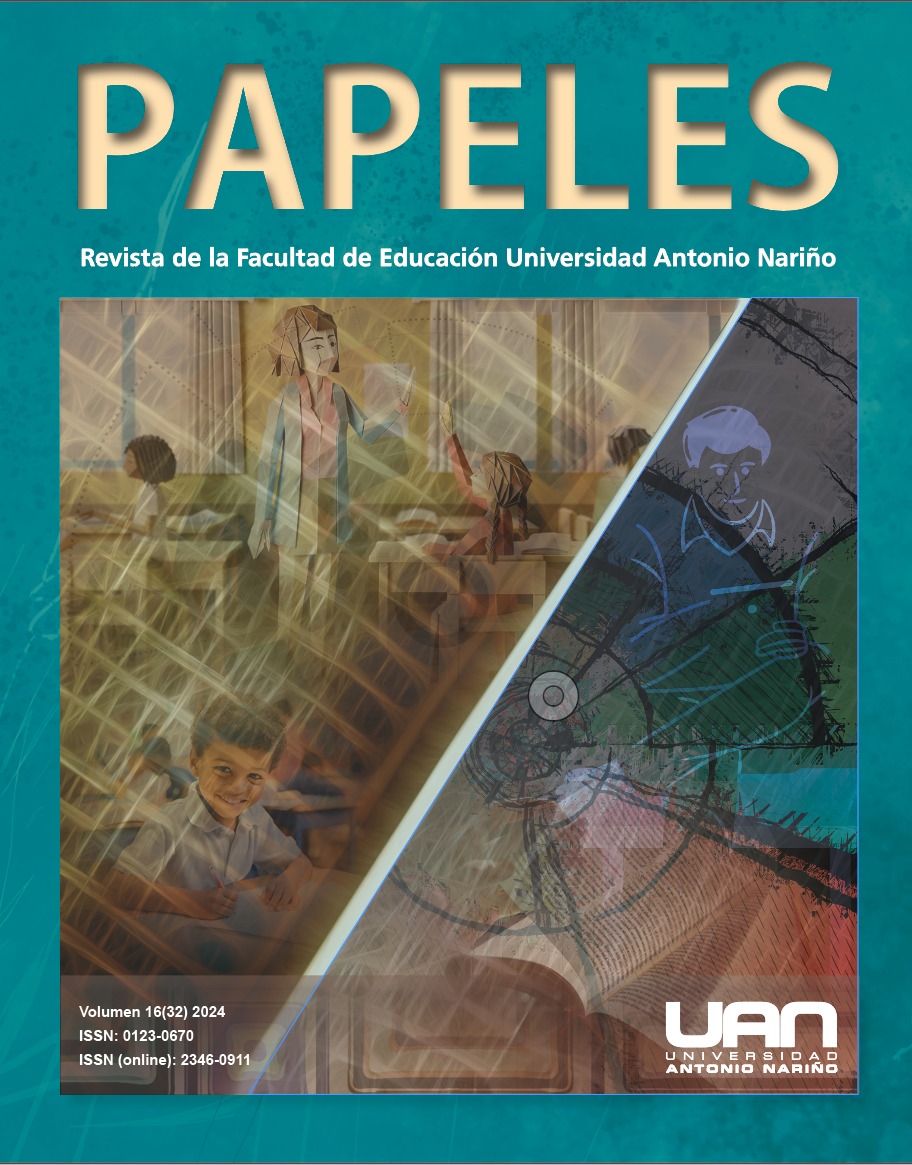Implementing Inquiry-based Learning through Sustainable Development Goals: A didactic Approach to Foster Learn-ing-to-learn and Citizenship Competencies in EFL
Aplicación del aprendizaje basado en indagación a través de los Objetivos de Desarrollo Sostenible: un enfoque didáctico para fomentar las competencias de aprender a aprender y de ciudadanía en EFL
DOI:
https://doi.org/10.54104/papeles.v16n32.1970Keywords:
Inquiry-based Learning (IBL), Sustainable Development Goals (SDGs), English as a Foreign Language (EFL), Secondary Education, Teacher TrainingAbstract
Introduction: This study employs a mixed-method approach to examine the integration of the Inquiry-Based Learning (IBL) approach with the thematic framework of the Sustainable Development Goals (SDGs). Methodology: Conducted in a fourth-year secondary school EFL class at a state school in Spain, the research focuses on a didactic implementation spanning three sessions. This initiative addresses the societal need to make classes more engaging and impart knowledge about our planet’s current state and society. Results and Discussion: Despite limitations in time and the number of participants, the results indicate that IBL, when combined with Agenda 2030, provides numerous benefits. These benefits include motivating students to engage in their learning process actively, enhancing communication through active participation, and fostering a sense of optimism about potential outcomes. Conclusions: The findings, derived from both qualitative and quantitative data, offer significant contributions to the field of education, particularly EFL, by demonstrating that the methodological alternatives and thematic focus can help students form meaningful connections with their learning, thereby increasing their involvement in their studies.
Downloads
References
Alameddine, M. M., & Ahwal, H. W. (2016). Inquiry based teaching in literature classrooms. Procedia-Social and Behavioral Sciences, 232, 332-337.
Alcantud-Díaz, M., & LLoret-Catalá, C. (2023). Bridging the gap between teacher training and society: Sustainable development goals (SDGs) in English as a foreign language (EFL). Globalisation, Societies and Education. https://doi.org/10.1080/14767724.2023.2283510
Alghamdi, A. K. H., & El-Hassan, W. S. (2020). Interdisciplinary inquiry-based teaching and learning of sustainability in Saudi Arabia. Journal of Teacher Education for Sustainability, 22(2), 121-139. https://doi.org/10.2478/jtes-2020-0020
Banquet Galindo, N. S., & Urrea Arcila, Z. (2020). Inquiry-based learning to foster active participation in the english class [thesis, Universidad de Córdoba]. https://repositorio.unicordoba.edu.co/server/api/core/bitstreams/c7161cd5-7656-4e66-9490-c4018dfa86f3/content
Baraquia, L. (2018). Interdisciplinary contextualization and inquiry-based learning: How engaging can it be? International Journal of Science and Engineering Investigations, 7(81). https://papers.ssrn.com/sol3/papers.cfm?abstract_id=4486803
Becker, S., Klein, P., Gößling, A., & Kuhn, J. (2020). Using mobile devices to enhance inquiry-based learning processes. Learning and Instruction, 69, 101350. https://doi.org/10.1016/j.learninstruc. 2020.101350
Berg, G. A. & Simonson, M. (2024). Distance learning. En Encyclopedia Britannica. https://www.britannica.com/topic/distance-learning
Chang, C., Chang, C. K., & Shih, J. L. (2016). Motivational strategies in a mobile inquiry-based language learning setting. System, 59, 100-115. https://doi.org/10.1016/j.system.2016.04.013
Cotton, K. (1988). Monitoring student learning in the classroom. Northwest Regional Educational Laboratory. https://files.eric.ed.gov/fulltext/ED298085.pdf
Decreto 107/2022, de 5 de agosto, del Consell, por el que se establece la ordenación y el currículo de la Educación Secundaria Obligatoria. https://noticias.juridicas.com/base_datos/CCAA/735994-d-107-2022-de-5-ago-ca-valencian-establece-la-ordenacion-y-el-curriculo-de.html
Dobber, M., Zwart, R., Tanis, M., & van Oers, B. (2017). Literature review: The role of the teacher in inquiry-based education. Educational Research Review, 22, 194-214. https://doi.org/10.1016/j.edurev.2017.09.002
García Vaquero, A- F., & Alcantud Díaz, M. (2023). Exploring tolkien’s literary universe in the EFL classroom: Ap-proaching literature through robotics-enhanced inquiry-based learning. Digital Education Review, 44, 1-12. https://doi.org/10.1344/der.2023.44.1-12
Gokalp, G., & Can, I. (2022). Evolution of pre-service teachers’ perceptions about classroom management and student misbehavior in an inquiry-based classroom management course. Action in Teacher Education, 44(1), 70-84. https://doi.org/10.1080/01626620.2021.1939194
Govender, I. H., & Pillay, R. P. (2022). Undergraduate inquiry-based research to promote sustainable development goal 11 (sustainable cities and communities). African Journal of Inter/Multidisciplinary Studies, 4(si1), 113-128. https://doi.org/10.51415/ajims.v4i1.1025
Kuhlthau, C. C., Maniotes, L. K., & Caspari, A. K. (2007). Guided inquiry: Learning in the 21st century. Bloomsbury Publishing.
Lee, H. Y. (2014). Inquiry-based teaching in second and foreign language pedagogy. Journal of Language Teaching and Research, 5(6), 1236-1244. https://doi.org/10.4304/jltr.5.6.1236-1244
Ley Orgánica 3/2020, de 29 de diciembre, por la que se modifica la Ley Orgánica 2/2006, de 3 de mayo, de Educación. https://www.boe.es/eli/es/lo/2020/12/29/3
Ludwig, C. (2021). “There is no such thing as ‘away’”: An inquiry-based approach to developing learners’ sustainability literacy in the EFL classroom. Ecozon@: European Journal of Literature, Culture and Environment, 12(1), 66-82. https://doi.org/10.37536/ecozona.2021.12.1.4012
OWIS Communications Team. (2020, August 21). Why is the inquiry cycle important for learners? One World International School. https://owis.org/sg/blog/why-is-the-inquiry-cycle-important-for-learners/
Pedaste, M., Mäeots, M., Siiman, L. A., De Jong, T., Van Riesen, S. A., Kamp, E. T., … & Tsourlidaki, E. (2015). Phases of inquiry-based learning: Definitions and the inquiry cycle. Educational Research Review, 14, 47-61. https://doi.org/10.1016/j.edurev.2015.02.003
Real Decreto 217/2022, de 29 de marzo, por el que se establece la ordenación y las enseñanzas mínimas de la Educación Secundaria Obligatoria. https://www.boe.es/eli/es/rd/2022/03/29/217/con
Satria, R., & Shahbana, E. B. (2020). The SWOT analysis of strengthening character education in junior high school. Jurnal Iqra’: Kajian Ilmu Pendidikan, 5(2), 56-67. https://doi.org/10.25217/ji.v5i2.827
Science Learning Hub. (2017). Climate change: A wicked problem for classroom inquiry. https://www.sciencelearn.org.nz/resources/2229-climate-change-a-wicked-problemfor-classroom-inquiry
Stibbe, A., & Luna, H. (2009). “Introduction.” In A. Stibbe (Ed.), The handbook of sustainability literacy: Skills for a changing world (pp. 9-16). Green Books.
Unesco (2014). Global citizenship education: Preparing Learners for the challenges of the 21st century. https://unesdoc.unesco.org/ark:/48223/pf0000227729
Unesco. (2014). Unesco roadmap for implementing the Global Action Programme on Education for Sustainable Development. https://unesdoc.unesco.org/ark:/48223/pf0000230514
Unesco. (2024, 23 October). What you need to know about education for sustainable development. https://www.unesco.org/en/sustainable-development/education/need-know
United Nations. (2015). Transforming our world: The 2030 Agenda for Sustainable Development. https://sustainabledevelopment.un.org/content/documents/21252030%20Agenda%20for%20Sustainable%20Development%20web.pdf
United Nations. (n.d.). The 17 Goals: Sustainable Development. https://sdgs.un.org/goals
Wale, B. D., & Bishaw, K. S. (2020). Effects of using inquiry-based learning on EFL students’ critical thinking skills. Asian-Pacific Journal of Second and Foreign Language Education, 5, 1-14. https://doi.org/10.1186/s40862-020-00090-2
Wals, A. E. J., Weakland, J., & Corcoran, P. B. (2017). “Introduction.” In P. B. Corcoran, J. P. Weakland, & A. E. J. Wals (Eds.), Envisioning futures for environmental and sustainability education (pp. 19-29). Wageningen Academic Publishers. https://doi.org/10.3920/978-90-8686-846-9
Published
-
Abstract529
-
PDF350
-
LENS17
-
XML47
How to Cite
Issue
Section
Categories
License
Copyright (c) 2024 Miryam Bravo Luque, María Alcantud-Díaz

This work is licensed under a Creative Commons Attribution-NoDerivatives 4.0 International License.






